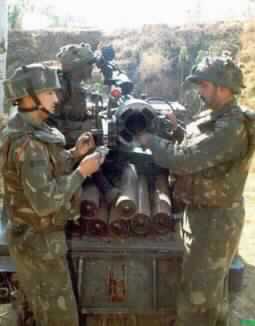HIGHLIGHTS: G8 Steps Up Pressure on Pakistan to Stop So-Called Cross-Border Terror||All Out Nuclear War Could Kill 12 Million People in Subcontinent||A Number of Western Countries Reduce Diplomatic Staff in Islamabad and New Delhi & Issue Travel Warnings to Their Nationals||STORY: The world's top industrial nations have stepped up pressure on Pakistan to stop Islamic militants from raiding Indian territory and avert war between the two nuclear-armed powers.
In a rare joint statement, foreign ministers of the Group of Eight said in Ottawa they were "gravely concerned about the risks inherent in the current crisis between India and Pakistan and destabilize the region and beyond".
"We call on Pakistan, in accordance with its commitments, to take concrete actions immediately to end infiltrations across the Line of Control (dividing Kashmir), and to stop terrorist groups operating from territory under its control," the statement said.
In a mark of growing concern, Western powers have advised tens of thousands of their nationals to leave India.
POWELL NEEDS ABSOLUTE PROOF
U.S. Secretary of State Colin Powell told the BBC in an interview there were indications Pakistan was trying to stop militants crossing the disputed border, but that he needed absolute proof of the clampdown.
"Instructions have been given to cease this kind of activity, but it is too early to say that it has stopped. If it does stop it must also stop permanently," he said.
Powell, who has been speaking to Pakistani President Pervez Musharraf and the Indian leadership almost every other day, also invoked the threat of nuclear war.
"Now, I think both sides recognize that the most horrific thing that could happen in the year 2002 is, for the second time in history, a nuclear exchange to take place," he said.
"The whole world would condemn whoever does that, and I think that is a sobering reality that both understand.
Nevertheless, they are nuclear-armed, and we don't want to go down this road to test any propositions as to whether they will or they won't," he said.
WORST-CASE SCENARIO
All-out nuclear war between India and Pakistan could kill as many as 12 million people and injure as many as 6 million, a Pentagon official said on Friday, citing a classified report.
"That's the worst-case scenario, if we have correctly guessed the number of weapons each side has, and their targets, and presuming they're all ground bursts versus air bursts," the official said, speaking on condition of anonymity.
Even in a "limited" war, with 10 bombs exploding in the major cities of each country, more than 3 million people could die in the immediate blasts and fire and from radiation, according to calculations by Princeton University nuclear researchers.
CROSS BORDER SHELLING
The two armies have been trading regular heavy fire across their frontier since a mid-May raid on an Indian army camp in Kashmir sharply increased tension. Dozens of civilians and soldiers on both sides have been killed and wounded. (Read photo caption)
The United States, Australia and Canada prepared to pull out non-essential diplomats. Germany and Canada advised their nationals to leave India if not on urgent business.
"Tensions have risen to serious levels and the risk of intensified military hostilities between India and Pakistan cannot be ruled out," the U.S. State Department said.
British Foreign Secretary Jack Straw said Britons should consider leaving and advised against traveling to India.
The United States, Britain and other Western nations have already reduced diplomatic staffing in Pakistan and urged expatriates to leave the country, where there has been a rash of attacks and threats against Westerners by Islamic militants.
DIPLOMATIC FLURRY
U.S. President George W. Bush is sending Defence Secretary Donald Rumsfeld and Deputy Secretary of State Richard Armitage to South Asia next week to try to cool passions.
Russia is hoping to persuade Pakistan's President Pervez Musharraf to hold one-on-one talks with Indian Prime Minister Atal Behari Vajpayee during a regional security meeting next week in ex-Soviet Kazakhstan. India has effectively ruled out such a meeting.
Russian President Vladimir Putin is planning separate meetings with the Indian and Pakistani leaders.
The G8 ministers --from Canada, Britain, the United States, Japan, Italy, France, Germany and Russia -- will decide at a meeting in mid-June whether to launch a special initiative in the region. They would remain actively engaged in contributing to a solution to the standoff.
"We call on India and Pakistan to continue to work with the international community to ensure that there will be a diplomatic solution to the current crisis," the ministers said.
But while Western governments sounded alarm bells, there was little sense of panic in India and Pakistan, and foreign nationals showed no signs of fleeing. International airlines reported no surge in demand for flights out of India.
PHOTO CAPTION
Indian troops patrol along the Line of Control near the city of Jammu, the winter capital of Kashmir state, on May 31. REUTERS/Arun Singh
- Author:
& News Agencies - Section:
WORLD HEADLINES


 Home
Home Discover Islam
Discover Islam Quran Recitations
Quran Recitations Lectures
Lectures
 Fatwa
Fatwa Articles
Articles Fiqh
Fiqh E-Books
E-Books Boys & Girls
Boys & Girls  Ramadan
Ramadan Fatwa Audios
Fatwa Audios Month of Mercy
Month of Mercy Women
Women Eed Al- Fitr
Eed Al- Fitr Food Recipes
Food Recipes Videos
Videos

 Prayer Times
Prayer Times












